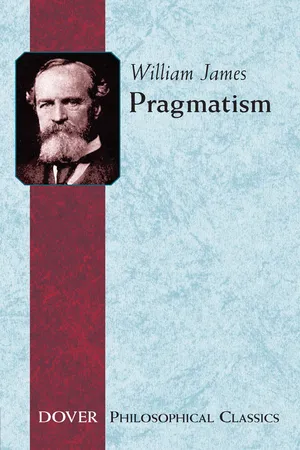
- 128 pages
- English
- ePUB (mobile friendly)
- Available on iOS & Android
Pragmatism
About this book
A profoundly influential figure in American psychology, William James (1842–1910) was also a philosopher of note, who used Charles S. Peirce's theories of pragmatism as a basis for his own conception of that influential philosophy. For James, this meant an emphasis on "radical empiricism" and the concept that the meaning of any idea — philosophical, political, social, or otherwise — has validity only in terms of its experiential and practical consequences.
James propounded his theories of pragmatism in this book, one of the most important in American philosophy. In a sense, he wished to test competing systems of thought in the "marketplace of actual experience" to determine their validity, i.e. whether adopting a particular philosophical theory or way of looking at the world makes an actual difference in individual conduct or in how we perceive and react to the varieties of experience. In these pages, James not only makes a strong case for his own ideas, but mounts a powerful attack against the transcendental and rationalist tradition.
For anyone interested in William James or the history of American philosophical thought, Pragmatism is an essential and thought provoking reference. In this handy, inexpensive edition, it will challenge and stimulate any thinking person.
Tools to learn more effectively

Saving Books

Keyword Search

Annotating Text

Listen to it instead
Information
William James
Pragmatism


Table of contents
- DOVER BOOKS ON AMERICANA
- Title Page
- Copyright Page
- Note
- Dedication
- Preface
- Table of Contents
- LECTURE I - The Present Dilemma in Philosophy
- LECTURE II - What Pragmatism Means
- LECTURE III - Some Metaphysical Problems Pragmatically Considered
- LECTURE IV - The One and the Many
- LECTURE V - Pragmatism and Common Sense
- LECTURE VI - Pragmatism’s Conception of Truth
- LECTURE VII - Pragmatism and Humanism
- LECTURE VIII - Pragmatism and Religion
- DOVER BOOKS ON WESTERN PHILOSOPHY
- William James - Pragmatism
Frequently asked questions
- Essential is ideal for learners and professionals who enjoy exploring a wide range of subjects. Access the Essential Library with 800,000+ trusted titles and best-sellers across business, personal growth, and the humanities. Includes unlimited reading time and Standard Read Aloud voice.
- Complete: Perfect for advanced learners and researchers needing full, unrestricted access. Unlock 1.4M+ books across hundreds of subjects, including academic and specialized titles. The Complete Plan also includes advanced features like Premium Read Aloud and Research Assistant.
Please note we cannot support devices running on iOS 13 and Android 7 or earlier. Learn more about using the app